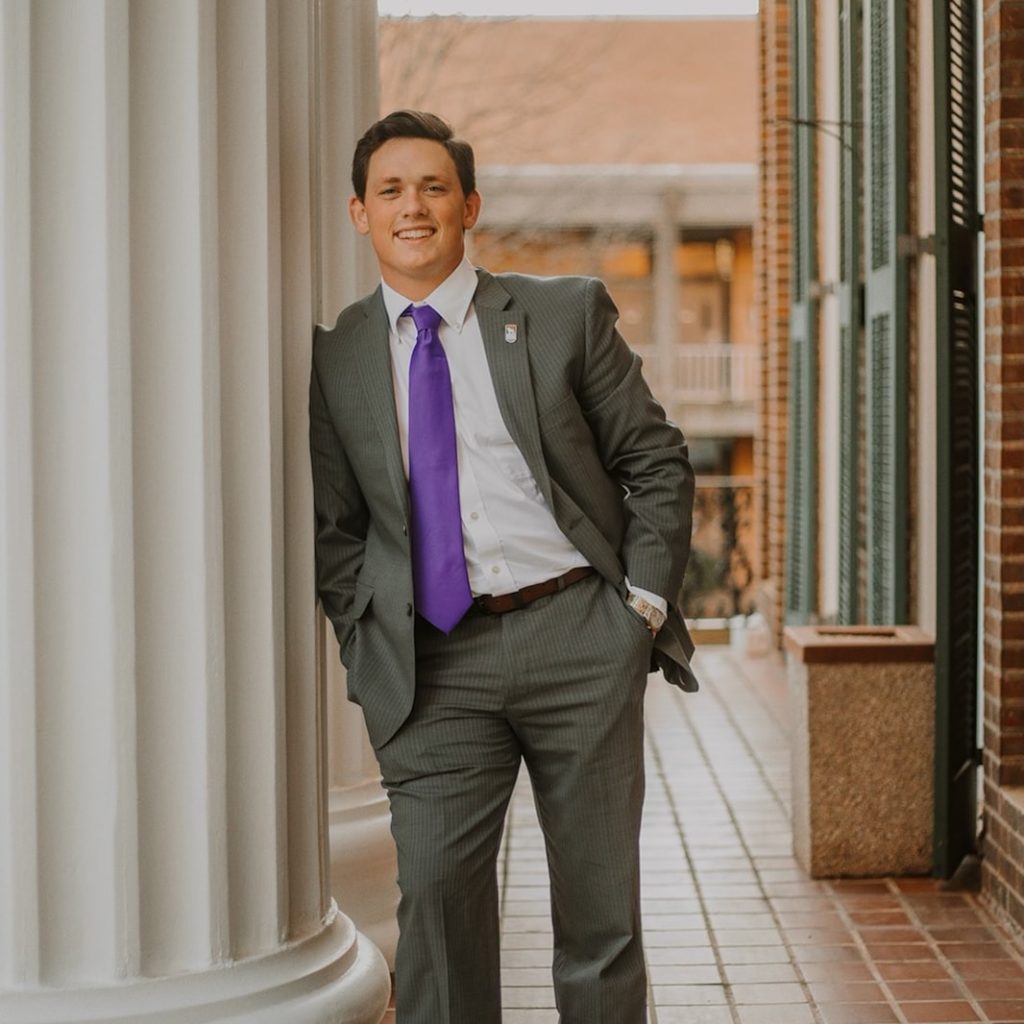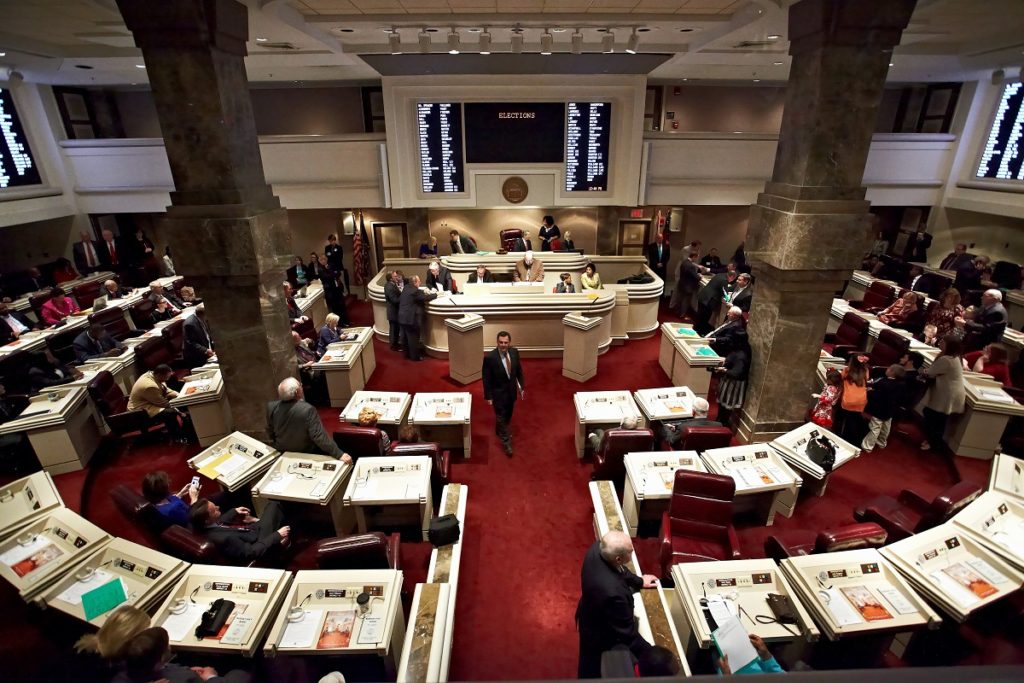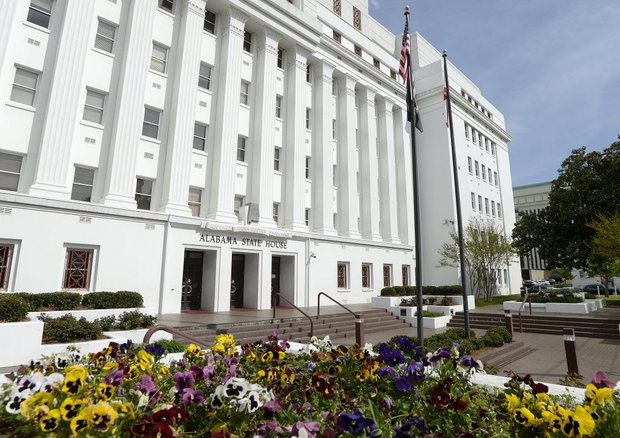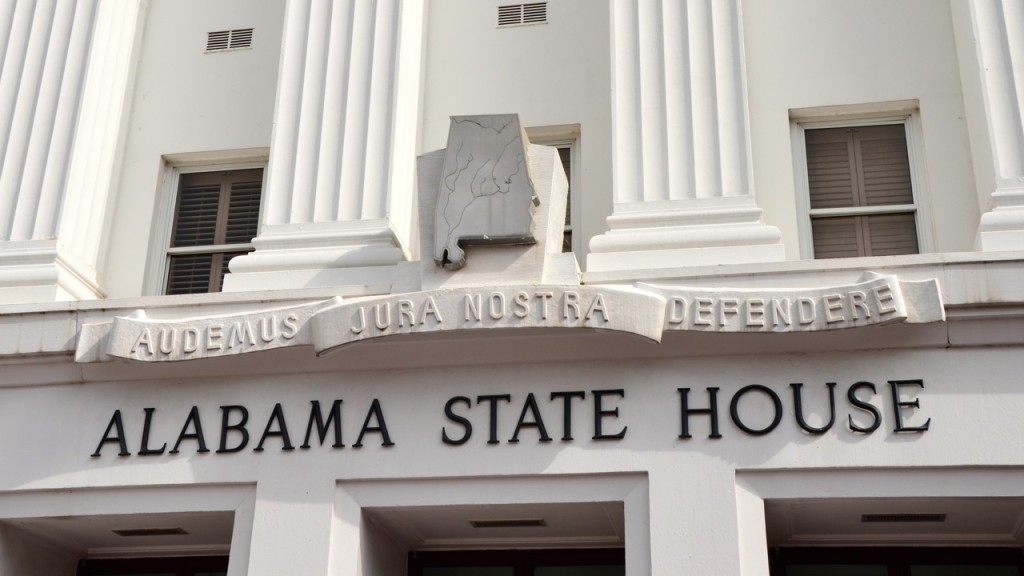House advanced bill named for slain police officer, Nick Risner

The Alabama House of Representatives on Thursday voted to restrict the use of good behavior incentives to shorten prison sentences, a bill brought in reaction to the slaying of a north Alabama police officer. Representatives voted 99-1 for the bill seeking to prohibit anyone convicted of manslaughter from qualifying for “good time” incentives. The bill now moves to the Alabama Senate. The bill is called the Sergeant Nick Risner Act. It is named after the 40-year-old Sheffield police officer who was killed while pursuing a suspect last year. Risner’s widow watched from the House gallery as lawmakers voted on the bill. “I’m bringing this bill, so hopefully another family will not have to go through what they did,” said Republican Rep. Phillip Pettus, the sponsor of the bill and a former state trooper. Brian Lansing Martin is charged with killing Risner, the father of one, and William Mealback Jr. of Cypress Inn, Tennessee. Martin had been released from prison in 2016 after serving a little over three years of a 10-year sentence after he pleaded guilty to manslaughter in the death of his father. Alabama currently allows some inmates sentenced to 15 or fewer years in prison to qualify for good behavior incentives. Good time is not given for Class A felonies such as murder and rape. The bill also would prohibit inmates convicted of manslaughter from qualifying for good time. “If you kill somebody, you do not get good time,” Pettus said of his bill. Behavior incentives are commonly used to try to combat prison violence by giving inmates a reason to follow rules. Pettus said Martin had his good time taken away, but it was later restored to him by a prison official. “Whoever let him out ought to take his place,” Rep. Lynn Greer, a Republican from Rogersville, said. While the bill had near-unanimous support, a few lawmakers questioned if the problem was with the good time statute or how it was applied in Martin’s case. They asked if it would be short-sighted to make the change. “I’m just concerned that we are going to take away the hope that those people have, and then where is the incentive for them to behave,” Rep. Charlotte Meadows, a Republican from Montgomery, said. Pettus responded that inmates convicted of manslaughter would still be eligible for parole. He said the legislation didn’t change anything else in the good time law, beyond making inmates convicted of manslaughter ineligible. Representatives stood to applaud Risner’s family after the vote. “Mrs. Risner, you have our respect and our prayers,” House Speaker Mac McCutcheon said. Republished with the permission of the Associated Press.
Alabama House GOP Caucus passes resolution supporting UNA Student Government President

University of North Alabama Student Government President Jake Statom gained recent support from the Alabama House Republican Caucus following student-led efforts to demand his resignation. Political pressure unsued following Statom’s repost of an Instagram post on his personal social media account about the “LGBTQ” agenda, adding a statement that sought to promote traditional morals and biblical values. Student activists responded to this by crafting a petition demanding his resignation from the student government presidency by June 30 and threatening impeachment proceedings if he failed to concede to their demands. Following this, Statom released a video apologizing to those who might have been hurt by his online comment and committing to being more thoughtful and considerate of differing perspectives, according to a recent press release from the Alabama House Republican Caucus. “My Republican colleagues and I recognize the courage it takes for college leaders to promote biblical principles and traditional values on campuses that are increasingly embracing the Cancel Culture and its ‘woke’ demands,” State Rep. Jamie Kiel said. “Because our founding fathers considered the freedoms of speech and religion so important, they made them the First Amendment of the Bill of Rights, and Jake Statom was simply exercising the liberties that are guaranteed to him.” Kiel sponsored a resolution in support of the student leader with House Republican Caucus members from across the state voting its approval. Other members of the local legislative delegation including State Reps. Lynn Greer (R – Rogersville), Phillip Pettus (R – Killen), Andrew Sorrell (R – Muscle Shoals) and State Sens. Larry Stutts (R – Tuscumbia) and Tim Melson (R – Florence) have also expressed strong support for Statom, according to Kiel. “Whether someone agrees with or opposes the stand that Jake Statom has taken, his constitutional right to speak freely and promote his religious beliefs must not be abridged with threats of impeachment and baseless attacks on his character,” Senator Stutts added. The text of the House Republican Caucus resolution reads: WHEREAS Jake Statom, an engineering major from Tuscumbia, was elected as president of the University of North Alabama Student Government Association in February; and, WHEREAS Statom reposted an Instagram post about the “LGBTQ” agenda and added a statement that sought to promote traditional morals and biblical values; and, WHEREAS some students responded to Statom’s comment, which was made on his personal social media account, with a petition demanding his resignation from the student government presidency by June 30 and threatening impeachment proceedings if he did not concede to their demands; and, WHEREAS Statom released a video statement apologizing to those who might have been hurt by his online comment and committing to being more thoughtful and considerate of differing perspectives; and, WHEREAS a student-led counter petition supporting Statom’s right to free speech and expression garnered more signatures than the one that issued threats of political reprisals; and, WHEREAS the university environment is traditionally one which promotes the free and open exchange of ideas – both conservative and liberal – and protects an individual’s right to their own religious beliefs, values, and moral standards; and, WHEREAS the dangerous “Cancel Culture” atmosphere that predominates on college campuses both in Alabama and across the country seeks to silence opinions that are deemed to be politically unacceptable to leftist ideologues and punish those who continue to adhere to traditional values, especially those rooted in fundamental religious teachings; and, WHEREAS, Statom committed no impeachable offense by simply exercising the basic freedoms of opinion, expression, and religion that are guaranteed to all Americans under the Bill of Rights of the U.S. Constitution; now, therefore, BE IT RESOLVED, that we, the members of the Alabama House Republican Caucus, support Jake Statom’s right to express and promote his personal beliefs in the public forum and recognize his voluntary willingness to apologize to those he might have offended; and, BE IT FURTHER RESOLVED, that we strongly oppose any effort to impeach, remove, or apply political pressure intended to force Jake Statom from the presidency of the University of North Alabama Student Government Association. Given under our hand and the seal of the Alabama House Republican Caucus on this 30th day of June, 2021. House Majority Leader Nathaniel Ledbetter House Majority Caucus Vice-Chair Connie Rowe
House committee extends Stand Your Ground law to Alabama churches

An Alabama House committee on Wednesday approved a bill that would extend the state’s Stand Your Ground law to churches. Sponsored by Rogersville-Republican State Rep. Lynn Greer, HB34 was sent to the full House on a voice vote by the House Judiciary Committee sent. Under existing law, a person is justified in using physical force, including deadly force, in self-defense or in the defense of another person under certain conditions. And a person is legally presumed to be justified in using deadly physical force, in self-defense or the defense of another person against a person committing or attempting to commit certain specified crimes. Under Greer’s bill, a person is presumed justified in the use of physical force to defend an employee, volunteer or member of a church from assault, whether on church grounds or in a church-related activity. Greer said he introduced the bill after churches in his district asked him to sponsor the legislation due to church shootings around the country. But not everyone is in favor of the bill. Members of Moms Demand Action for Gun Sense in America opposed the bill in a public hearing last week, putting pressure on lawmakers to reject it. There, Anne Leader, leader of the Alabama Chapter of the group, argued that Stand Your Ground laws allow people to “shoot first and ask questions later.” The bill moves on the full House for consideration.
Tensions over “monkey” email erupt on House floor

Simmering tensions over a monkey email sent by an Alabama legislator erupted into shouting match on the House floor. A black lawmaker on Thursday night said a Republican legislator had offered only excuses, and not an apology, for the email The email forwarded Wednesday by Republican Rep. Lynn Greer, of Rogersville, described an experiment showing how punished monkeys will eventually stop reaching for a dangling banana as they accept the status quo. It was sent as African-American lawmakers used delaying tactics to fight legislative districts. Rep. John Rogers, a black lawmaker from Birmingham shouted at Greer, “I’m not a monkey. … You are a damn monkey.” Greer said the email was about the need to replace incumbents. The tensions threatened to derail the last days of the legislative session. ___ A white Alabama legislator has stirred outrage after sending an email that black lawmakers condemned as racist. The email forwarded Wednesday by Republican Rep. Lynn Greer, of Rogersville, described an experiment showing how punished monkeys will eventually stop reaching for a dangling banana as they accept the status quo. It was sent as African-American lawmakers used delaying tactics to fight legislative districts they said minimized black voters’ influence. House Black Caucus Chairman John Knight called the email, “the most racial insult I’ve ever seen.” The tensions in the statehouse threatened to derail the last days of the legislative session. Greer says he apologized to the black caucus, and says he didn’t “mean anything bad.” He says the email meant all incumbents need to eventually be replaced. Republished with permission of the Associated Press.
Alabama Retail Association: Alabama lawmakers consider move of state’s tax-free holiday weekend

The state’s education budget committees have signed off on moving Alabama’s back-to-school sales tax holiday from the first full weekend of August to the third weekend of July. Wednesday, Feb. 15, the House Ways and Means Education Committee approved HB132 by Rep. Lynn Greer, R-Rogersville; and the Senate Finance and Taxation Education Committee approved SB136 by Sen. Tim Melson, R-Florence. Both bills now move to their respective chambers for consideration. The date change will ensure the tax holiday occurs before the start of the school year throughout the state. Several years in its 11-year history, the August sales tax holiday occurred after school had started in many areas of the state, making it impossible for parents to take advantage of the tax savings. Twice in that history, sales tax collections experienced a decline in the month of August (See graphic below). Both years, the tax holiday occurred at the absolute latest possible time it could, Aug. 7-9, well after most schools had started classes. Alabama Retail championed this tax holiday and made its passage our top legislative priority in 2006, the year the holiday began. Your association supports having the tax holiday start on the third Friday of July each year. If enacted, the timing change would begin with the 2017 tax holiday, moving it to July 21 to 23. ••• This article was first published on the Alabama Retail Association website.
Lynn Greer & Katherine Robertson: The fight for pension reform in Alabama

Like many pension funds across the country, the State of Alabama’s public pension system faces significant funding challenges. Alabama’s pension costs have doubled over the last ten years, despite the fact that the legislature has never missed paying the steadily increasing annual required contribution. In the past, this payment was made with little fanfare, but ongoing budgetary woes have demanded a higher degree of scrutiny. Last year, in the face of a $200 million shortfall for the state’s general fund, every program or service was on the chopping block. Alabama’s Republican governor tried to raise over $500 million in new taxes, but vehement opposition from the general public left the proposal dead on arrival. Without new revenue, the Alabama Legislature spent nearly seven months struggling to cut its way to a balanced budget. State parks and driver’s license offices were closed, road projects were threatened, and law enforcement offices braced for layoffs. All the while, Alabama’s public pension system received nearly $1 billion from taxpayers. While state leaders have begun to pay more attention, Alabama’s taxpayers have not yet come to grips with the high cost of the state’s public pensions. The haze of misinformation surrounding the debate often obscures the reality: the state has at least a $15 billion funding gap that will not be closed until 2050, at the earliest. Over the next twenty-five years, the projected amount of the state’s yearly contribution–the cost of paying for new benefits earned and a portion of the existing unfunded liability–as presented on a bar graph looks like a steep staircase, topping out at over $2 billion in 2044. That staircase only leads to full funding by 2050 if the state does not accrue any additional unfunded liabilities between now and then. To avoid amassing any new debt, the system will have to steadily hit its 8 percent target investment return. If the S&P 500 is any indication — it is down by .48 percent over the last year and up only 4.9 percent over the last ten years — this will be a difficult task. A recent report from the PEW Charitable Trusts estimates that if Alabama’s pension investments return 6.25 percent rather than 8 percent over the next 40 years, Alabama’s funded ratio would dip below 60 percent while the annual contribution would top out at $5 billion around 2050. By comparison, Alabama only collects around $10 billion per year in state taxes. Still, plan administrators maintain that 8 percent is an appropriate assumption and that present underfunding will work itself out. As evidence, they cite average returns of 8 percent or better over the last 30 or 35 years. But past performance doesn’t guarantee future results, nor do average returns tell the whole story, since the state accumulated massive unfunded liabilities during the same time period. Volatility is the curse of traditional defined benefit pension plans–and that’s the foundational problem for many states, including Alabama. Even if investments return 8 percent or better on average, just one down year (especially if during an early year) can substantially impact the plan’s funding level and take years to recover from. Down years can also lead to risky investments. The more that pension investors stretch to achieve higher returns, the higher the risk of generating additional unfunded liabilities. In spite of these sobering facts, pension reform in Alabama faces an uphill battle. In Montgomery, lawmakers are bombarded with thinly veiled threats from groups and associations who don’t want anyone to “touch their pensions.” Representatives of the public pension system insist that nothing needs to change. Every academic from inside or outside the state who has dared to question the shaky trajectory of Alabama’s pensions has been publicly maligned. The few politicians who have shown a willingness to lean into the problem have been vilified in newspapers and accused of trying to “raid the retirement system.” As is often the case, the groups fighting pension reform in Alabama represent the very individuals who will be badly hurt if the state cannot keep its promises. Though it may not be an easy lift politically, state leaders have a duty to ensure a solvent pension system for public employees and retirees. They also have a duty to protect future generations of Alabamians from inheriting a fiscal catastrophe. Will taxpayers be willing to double their investment–or even, according to some projections, triple or quadruple their investment–in the pension plans of state employees and retirees, pension plans that are likely better than their own? Should they be asked to do so? The people who will be called upon to either pay up or go without certain government services may not be the constituents of current politicians, but they will be their children and grandchildren. One thing is certain: pension reform will come to Alabama. Responsible reforms can be adopted now, or the state will be forced to make hasty, draconian changes during the next severe economic downturn. The involuntary, reactive option will present a much uglier scenario for retirees, taxpayers, and politicians alike. • • • Lynn Greer represents District 2 in the Alabama House of Representatives and co-chairs the legislature’s Joint Committee on Public Pensions. Katherine Green Robertson is Vice President for the Alabama Policy Institute (API). API is an independent, nonpartisan, nonprofit research and educational organization dedicated to the preservation of free markets, limited government, and strong families.
Lawmakers frustrated with state Medicaid program’s $157M budget request

Alabama’s Medicaid commissioner told lawmakers Wednesday that the agency will need an additional $156 million to maintain services next year, a funding request that caused lawmakers to criticize the expense of the health care program and its recipients. Medicaid Commissioner Stephanie Azar said the program faces increased costs from inflation and owes money to the federal government because of overpayment. “I don’t envy the legislature in trying to determine that revenue, but it’s not going to be a good set of circumstances. If we were to be level-funded like we were last year, we would have to cut every optional service that we have, such as hospice, outpatient dialysis and other optional programs,” Azar said. Azar said the agency will need at least close to that amount to continue the implementation to managed care through Regional Care Organizations, something the state hopes will help contain cost in the future. One million Alabamians receive Medicaid. A little more than half of those recipients are children under the age of 18. Azar said there are very few abled-bodied adults who receive Medicaid in Alabama. Lawmakers expressed frustration about the cost of the health care program for the poor and disabled and some criticized recipients. “Unless we can get control of Medicaid, it could be the downfall of everything,” Rep. Lynn Greer, a Rogersville Republican. Sen. Larry Stutts, an obstetrician, said he has seen Medicaid patients call ambulances when they are in labor, while his private-insurance patients never arrive at the hospital that way. “When we look at what we’re asking taxpayers to subsidize, it’s absurd how much waste there is,” said Republican Stutts of Muscle Shoals. Other members criticized emergency room usage by Medicaid recipients. Democrats on the committee said most people on Medicaid in Alabama are children of the working poor or are disabled adults, and might have difficulty getting to medical appointments because of transportation issues. “They’re really poor people, correct,” said Democrat Rep. John Knight of Montgomery. Azar said there is little the state can do to restrict programs since the federal government provides 70 percent of the money and sets the Medicaid rules. Republished with permission of the Associated Press.
Alabama Grocers celebrates 25 years, names annual award recipients

The Alabama Grocers Association held a celebration Wednesday in Birmingham to honor the year’s top Vendor, Retailer and Wholesaler of the Year Award Winners, as well as mark their 25th year advocating for the priorities of the state’s grocery retailers, manufacturers, brokers and wholesalers. State Rep. Lynn Greer and state Sen. Cam Ward were on hand for the annual fete held at The Club in downtown Birmingham, as was Deputy Director of the state’s Legislative Fiscal Office Mr. Kirk Fulford. The three participated in a legislative panel where they discussed the 2016 budget situation and some of the AGA’s policy priorities. The group, known as “the voice” of Alabama grocers, also gave awards to top-voted members in categories that represent the three legs of the grocery industry. The group named its Vendor of the Year Bob Crawford, President of United-Johnson Brothers of Alabama. Retailer of the Year was Mr. Chris Litz, Regional Director, West Region, Publix Super Markets. And David Bullard, President and CEO of Piggly Wiggly Alabama Distributing Company, took home the Wholesaler of the Year Award. The AGA claims some 135 retail members operating nearly 1,000 stores nationwide, as well as over 225 manufacturers, brokers, wholesalers and other members. According to the group, grocery stores generate over $3.6 billion in annual sales, employ 25,000 Alabamians jobs earning over $750 million in annual wages, andl pay in excess of $300 million in state and local taxes per year.
House budget panel weighs testimony on 2 plans to avert budget shortfall

Tuesday, the House’s General Fund budget committee weighed testimony on two proposals to save money as an overall plan to avert a state budget shortfall. Rep. Lynn Greer presented House Bill 588 a plan to convert two state holidays into furlough days while House Bill 590 from Rep. Arnold Mooney cuts longevity pay, a yearly payment made to state employees each December based on how long they have worked for the state, for the coming fiscal year. During the public hearing, Mac McArthur, executive director of the Alabama State Employees’ Association, urged the committee to delay voting on both bills until a decision had been made on Sen. Del Marsh’s gambling proposal. “Don’t balance the budget on the backs of state employees,” he said. “Are you going to look at those people who have served you over and over and tell them ‘We’re gonna cut your pay?’” The pressure is on for lawmakers to agree on a plan to avoid across-the-board budget cuts because of a budget shortfall. Gov. Robert Bentley has urged lawmakers to pass a set of tax increases in order to boost revenue to the General Fund. On Monday, the governor threatened to call a Special Session of the Legislature if lawmakers fail to approve his plan to increase revenue to the General Fund. The committee chairman indicated that the panel will reconvene on Wednesday for a formal vote.
Lawmakers announce flat income tax proposal

With the frustration of doing taxes still fresh on the minds of the American people, two Alabama state lawmakers have unveiled a plan that would restructure Alabama’s individual and corporate income tax to permanently change the way taxes are done in the state. Republicans Sen. Bill Hightower of Mobile and Rep. Lynn Greer of Rogersville announced a “radical new approach” to simplify the state’s income tax structure at press conference Tuesday afternoon, according to AL.com. The senator’s plan will serve to remedy what the Times Daily describes as an “unbalanced tax code has posed revenue problems [in Alabama] for decades,” by implementing a flat tax. Defined as “one tax rate that is applied to all income with no exceptions” by the Alabama Policy Institute, a flat tax essentially means that everyone in the state of Alabama would pay the same share of their income, no matter how much or how little they make. Further, a flat tax would not tax savings and investment, promoting job creation and capital formation, in order to help bolster Alabama’s economy. “Every year, [the] state government gives away over $2 billion in incentives, credits, and exemptions,” Hightower said. His plan would solve that problem by reducing the individual income tax rate from 5 percent to 2.75 percent; the corporate rate would drop from 6.5 percent to 4.59 percent, according to details obtained by the Decatur Daily. Designed to be revenue neutral, no official legislation has been filed or made public, should the Alabama Legislature pass the plan, it would still require a constitutional amendment and the endorsement of Alabama voters through a statewide vote before becoming permanent law. That could only happen in a special election, next year’s presidential primary or the general election.


